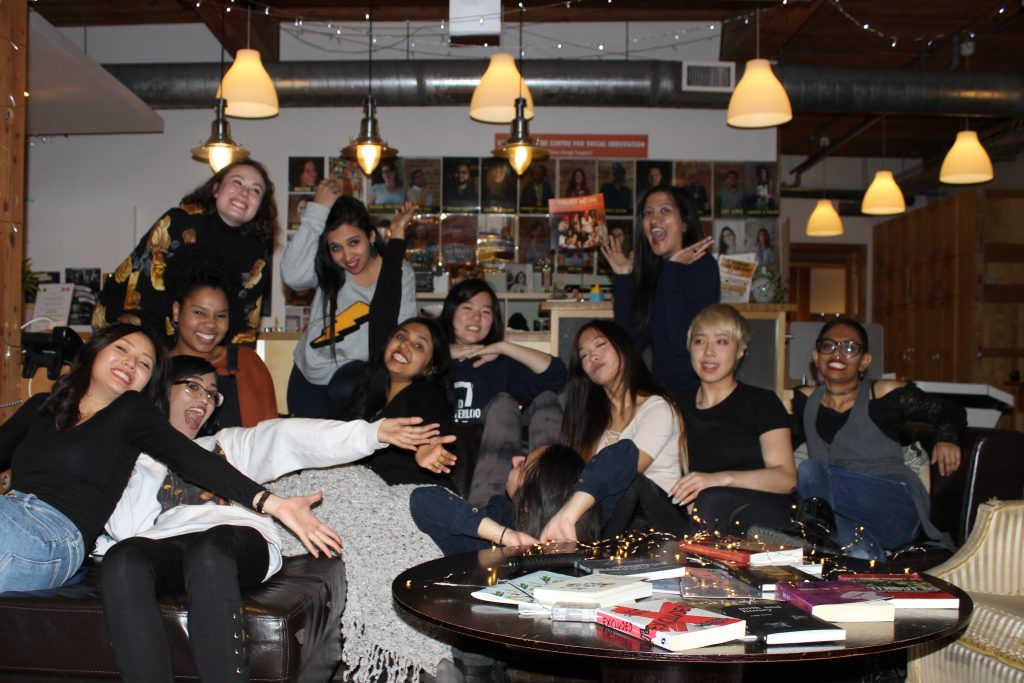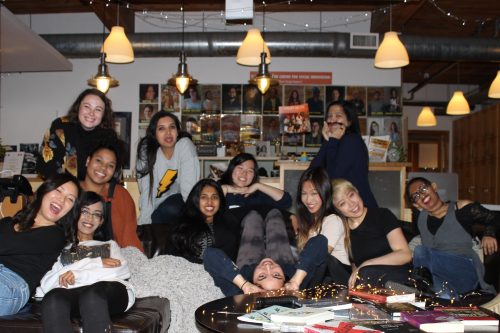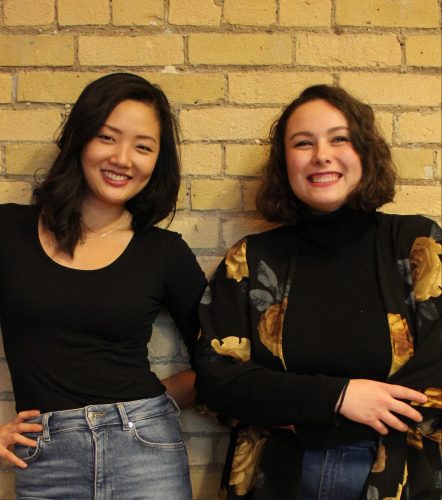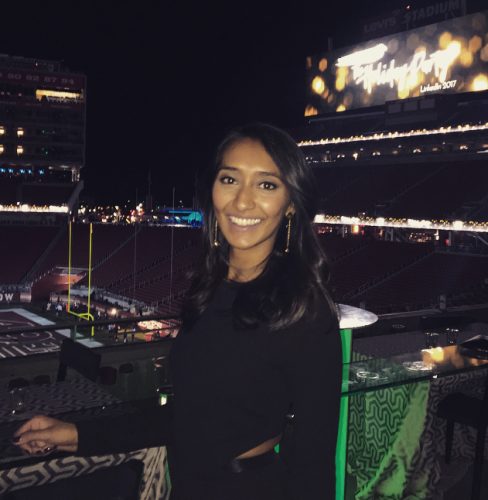
by Nur Kara – Follow @Nurkara28
All photos courtesy of the Nuance team.
Activists, Eleni Han, Emma Burgess, and Deepanjali Mensinkai, put their talents and passions together to found Nuance, an independent, online publication focused on diversifying and expanding the conversation surrounding sex, sexuality, relationships, and health. A platform for the underrepresented voices of young first and second generation immigrant and migrant people, Nuance represents how our intersectionality shapes our experiences living on Turtle Island (North America). Nuance intends to bridge the gap between young people and service providers by adding and contextualizing local and online resources to relevant pieces. In the words of its founders:
“Nuance is a movement that is encouraging us to dig deeper within ourselves, to reflect and question, and to seek perspectives we are missing on difficult sexual health issues that cannot always be understood from a black and white lens.”
I had the chance to learn more about these women, their passions, and their goals for Nuance.

How did you all come up with Nuance and what are each of your roles?
Eleni: “Nuance answers a long-standing community need of immigrant, first and second generation youth, but it started as a conversation between friends. It was in 2015 when I started asking the very non-unique, young adult question of “what is my purpose?,” when I found clues in Emma and her loud passion for sexual and reproductive health (Tip: find passionate people, they will change your life). As Emma and I reflected on our experiences and that of friends, it became clear there was something unique about the context of navigating sex and sexual health growing up in North America, as an immigrant from another country.
In 2016, we took the radical (read: not radical at all) notion of validating these ideas with our community by speaking with young women in the Greater Toronto Area. We found young immigrant women from varying cultures and religious backgrounds felt guilt in discussing sex and sexual health, accessed information online for ease and anonymity, and wanted better information and representation of their circumstances in media and services. Ultimately, we decided Nuance was where we would begin in our mission to pursue a world free of barriers to sexual health well-being.
In the past year, the three of us secured funds, put out our inaugural call for submissions, and launched the platform with the help of two other team members: Allie Zheng and Jessica Ferne. A critical step was to recruit and find a team of 10 writers, artists, and community development enthusiasts who really understood the mission of Nuance, and are now shaping the voice of the publication based on their intersectional perspectives and needs, and connections to their communities. As the Nuance community grows, we see ourselves increasingly as agents behind the scenes, using our skills to maintain, sustain, and grow a platform for underrepresented voices.”
[Read Related: Sexual Assault and Intimacy: 5 Sex Tips I Wish Someone Told Me]
What went into making this project a reality?
“A lot of re-focusing, time, funding and difficult conversations over the course of two years.
Focus. When we first started out, we didn’t necessarily have an idea of what we wanted to do, only an idea of the problem. We went through several ideas before we landed on the idea for Nuance as a digital platform around September of 2016. This came from understanding what was already out there, what was missing, and a realistic internal assessment of what we were best positioned to do from our varying intersections and positions in society.
For instance, we knew that previous sexual health campaigns and sites targeting young people were heavy on the “medical” aspects of sex, often through a white, able-bodied, heterosexual, and cis-gendered lens. Hence, we decided to position Nuance as a platform for marginalized voices whose needs weren’t being addressed by the current system.
Time. When you’re working on a side hustle, it’s easy to get frustrated when things aren’t moving as quickly because life and other demands get in the way. There is also something to be said about growing slowly and steadily – you have more time to think about who you want to be as an organization and how you want to handle things.
Funding. Earlier in May of last year (2017), we were successful in securing ~$75K from the Ontario Trillium Foundation’s Youth Opportunities Fund to pay for the content we publish from underrepresented writers and artists in the community. We are grateful that this funding allows us to fill a niche to provide much needed paid, capacity-building opportunities for the work of underrepresented artists and writers.
Difficult Conversations. Most of our difficult conversations with each other have been about mindful communication, particularly when working virtually, and accountability aka owning up when you mess up. In a larger organization, there’s diffusion of responsibility; when it’s a smaller team working on a passion project, you feel it when people aren’t happy and not everyone is pulling their weight.”

In what ways do you find that your personal upbringings coincide with Nuance’s mission?
Eleni: “Having no word for ‘sex,’ I’ve always been fascinated by how little Chinese culture talked about the subject and how much Western culture did. I was even more confused by how conservative the Church was when the Bible itself was filled with stories of seduction, incest, and adultery. My curiosity never waned, but I certainly took on feelings of guilt, shame, and patriarchal ideas of love, relationships, and sex. The writers, artists, and community I have met through Nuance give me so much inspiration and hope for myself, and for the next generation of young people navigating this amazing aspect of humanity.”
Emma: “I went through puberty, got my period, grew large breasts and all that jazz in grade four, and just about everyone has had something to say and sexualize about my body. During those years it was the internet and forums run by pad and tampon brands where I was able to find a community and place to read about my body changes and eventually masturbation, relationships, and sex but were often also from a singular, white, cis-lens perspective. Nuance expands the sexual health experiences and perspectives and offers solutions for and from the community so that they actually fit.”
Deepa: “As someone brought up with the mantra of ‘studies first, boys never until you’re 25 and then we’ll ask you when you’re doing a master’s and when you will get married,’ you can imagine sex and relationships was not a topic of discussion in our household. I definitely did not feel like it was something I could ask my family about and so I relied on what my friends told me and what I saw in pop culture. Nuance is the resource I’ve always needed, but never knew I needed to feel like my perspective belongs and to actually guide me to resources and a community to answer my questions as I navigate, and look to help others navigate, sexual health.”
[Read Related: ‘The Deed is Done’: A South Asian’s View on Sex and Virginity]
What are your future plans and hopes for Nuance?
“We’ve really only just started, but we have several areas we are thinking about in terms of strategic direction for the near future:
The first is to build a nuanced sexual health community, both online and here in Toronto. We are here to spark dialogue and allow for the inclusion of more voices in mainstream conversations around sex. In the past few months, we have already seen very interesting perspectives bubble up to the surface through our most popular pieces on the fetishization of East Asian women, balancing privilege in intimate relationships, queer representation beyond media, and dating as a desi gay in Toronto. We have exciting pieces coming up on having sex with God, exploring porn and menstruation as a desi woman, and experiencing sex-ed at a Catholic school.
The second is to better understand what it means to be immigrants and migrants on Indigenous territories and how we might become allies through the lens of sexual health. As Canada finishes ‘celebrating’ 150 years of colonization, many folks are looking to understand what they can do as part of Truth and Reconciliation. A mentor encouraged us to learn about and spread awareness on Indigenous issues that are closest to our hearts. For us, that means learning from the different frameworks by which Indigenous peoples see and teach sexual health, acknowledging how colonialism has impacted people with genders outside of the binary, advocating for the missing and murdered Indigenous women, and understanding environmental impact on reproductive health. We want to find a way to work together to decolonize health by removing the systems built to oppress to achieve reproductive justice—where communities and individuals have the freedom and agency to decide what’s healthy for them.
The third is to keep a pulse on the changing experiences of immigrants and migrants navigating sex and sexual health in order to adapt to our community needs. Social behavior and attitudes are influenced by pretty much everything, such as laws, politics, media, education, culture, and ethnicity. While both Canada and the US were built through the labor of immigrants and enslaved people, we have not had our proportionate hand in the design of these societies. As immigration continues and those factors change, systems of power, sex and sexual health needs and approaches will change as well. Hence, the immigrant sexual health experience will not be the same in 20, 50 or 100 years.
To sum up, we are comfortable with change both big and small, so long as we continue to deliver solutions that are informed, accessible, and from a place of truth.”
[Read Related: #BrownGirlsTalkSex: Committing the Mother of All Sins as a Pakistani-Muslim Woman]
What is some advice that you would give to fellow female activists aspiring to launch a creative, storytelling platform of their own?
- Find people passionate about the idea, sometimes you won’t have all the skills, but together you can make it happen
- Going against the grain is not fun and glam. People will hate on you. When that happens, remember why you’re doing it and draw from that place.
- Trust that there is more than one way to do things. Relinquish control over the small stuff so that you can keep your larger momentum going.
- Admit what you don’t know and ask for help from each other. Apologize and take accountability for your mistakes both within the team and as a group.
- Respect others in your community that are working towards the same goal. Having winners and losers is what led to problems in our society in the first place.
- Learn to say no to things you want to do because they are comfortable and easy, learn to say yes to things you don’t want to do because they are difficult.
- There is no such thing as overnight “success”, or sometimes, success at all. Learn to appreciate the process and the purpose of what you’re doing.
- Pay yourself and your team if you get funding. Pay artists for their work.
- There will be moments where you are overwhelmed. Rethink and prioritize. Focus on doing the one or two things that actually matter. Try again tomorrow.
- Appreciate and thank each other ALL the time. Your team and community is everything.
- Take time to rest. You can’t care for your community if you don’t care for yourself.
Read & Clap for Nuance here.
Follow & Share on Facebook, Twitter, Instagram.
Contribute your own story to Nuance here.
About Eleni: She was born under the one-child policy in China, but ultimately ended up with a younger sister (‘cause immigration is lonely), moving from China to the United States, and eventually Canada. Nuance, in many ways, is a tribute to her 10-year-old self: an avid reader and budding writer with dreams that were less tied to goals and status, and more to the feelings and experiences of navigating her many worlds. In addition to co-leading the Nuance team in the strategy and execution of the publication, she currently works across sectors to improve access to reproductive health commodities in emerging markets at the Clinton Health Access Initiative (CHAI).

About Emma: She couldn’t be happier spending her time almost exclusively behind the scenes of Nuance. She spearheads the branding and design elements, while coordinating the logistics of the publication, including team meetings and the various moving parts of each piece before hitting “publish.” Emma has her masters in sexual health research and has worked on projects exploring the abortion experiences of former Peace Corps volunteers, access to abortion in Ontario, factors that influence changes in individuals’ attitudes towards sex over their lifetime, global access to HIV medications, and HIV prevention for young women.

About Deepa: She is an east coast, Canadian-born desi trying to make her way on the west coast in San Francisco. Deepa currently works as a business strategist for LinkedIn Learning, helping both individuals and companies grow through personalized and engaging online learning. She has been part of the founding teams for three nonprofit organizations focused on the things she cares most about: diversifying conversations, women helping women, and the greater Toronto community. While living on opposite coasts from the Nuance team has been difficult, she continues to help the team as an advisor, advocate, and social media promoter, and is constantly on the lookout for ways to grow Nuance and further its reach.
 Nur Kara is a medley of Indian ancestry and East African heritage. Being part of a refugee history and having lived through these various lenses inspires her to similarly share in others’ stories. A self-coined “skeptiste,” she questions the uncommonly questioned.
Nur Kara is a medley of Indian ancestry and East African heritage. Being part of a refugee history and having lived through these various lenses inspires her to similarly share in others’ stories. A self-coined “skeptiste,” she questions the uncommonly questioned.




